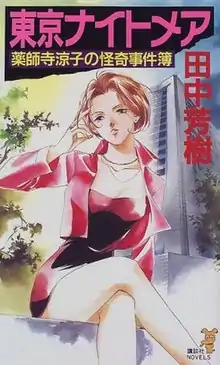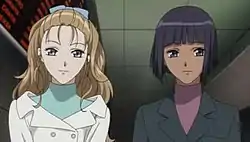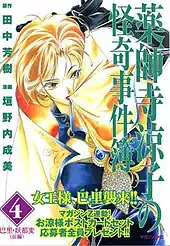Yakushiji Ryōko no Kaiki Jikenbo
Yakushiji Ryōko no Kaiki Jikenbo (Japanese: 薬師寺涼子の怪奇事件簿, lit. "Ryōko Yakushiji's Strange Case Files"), known in English as Ryoko's Case File, is a Japanese light novel written by Yoshiki Tanaka and illustrated by Narumi Kakinouchi. It was adapted into manga and an anime television series, two Drama CDs had also been released prior to the anime adaptation with different voice actors.
| Yakushiji Ryōko no Kaiki Jikenbo | |
 Cover of the first volume | |
| 薬師寺涼子の怪奇事件簿 | |
|---|---|
| Light novel | |
| Written by | Yoshiki Tanaka |
| Illustrated by | Narumi Kakinouchi |
| Published by | Kodansha |
| Original run | October 15, 1996 – December 20, 2018 |
| Volumes | 11 |
| Manga | |
| Written by | Yoshiki Tanaka |
| Illustrated by | Narumi Kakinouchi |
| Published by | Kodansha |
| Magazine | Magazine Z |
| Demographic | Seinen |
| Original run | March 1, 2004 – March 1, 2009 |
| Volumes | 11 |
| Anime television series | |
| Directed by | Tarō Iwasaki |
| Written by | Hiroyuki Kawasaki |
| Studio | Doga Kobo |
| Licensed by | |
| Original network | tvk, Chiba TV, TV Saitama, Sun TV, Tokyo MX, TV Aichi, KBS, BS11, Kids Station |
| Original run | July 5, 2008 – September 27, 2008 |
| Episodes | 13 |
| Manga | |
| Yakushiji Ryōko no Kaiki Jikenbo: Kiri no Hōmonsha | |
| Written by | Yoshiki Tanaka |
| Illustrated by | Narumi Kakinouchi |
| Published by | Kodansha |
| Magazine | Monthly Afternoon |
| Demographic | Seinen |
| Original run | March 25, 2009 – November 25, 2009 |
| Volumes | 2 |
| Manga | |
| Yakushiji Ryōko no Kaiki Jikenbo: Suiyobi ni Goyojin | |
| Written by | Yoshiki Tanaka |
| Illustrated by | Narumi Kakinouchi |
| Published by | Kodansha |
| Magazine | Monthly Afternoon |
| Demographic | Seinen |
| Original run | January 25, 2010 – September 25, 2010 |
| Volumes | 2 |
| Manga | |
| Yakushiji Ryōko no Kaiki Jikenbo: Jyoō Heika no Maneki Neko | |
| Written by | Yoshiki Tanaka |
| Illustrated by | Narumi Kakinouchi |
| Published by | Kodansha |
| Magazine | Monthly Afternoon |
| Demographic | Seinen |
| Original run | August 25, 2012 – November 24, 2012 |
| Volumes | 1 |
| Manga | |
| Yakushiji Ryōko no Kaiki Jikenbo: Makyo no Jyoō Heika | |
| Written by | Yoshiki Tanaka |
| Illustrated by | Narumi Kakinouchi |
| Published by | Kodansha |
| Magazine | Monthly Afternoon |
| Demographic | Seinen |
| Original run | December 25, 2012 – September 25, 2013 |
| Volumes | 2 |
Plot
The series is centered on an elite police officer named Ryōko Yakushiji. A graduate of Tokyo University's Law Faculty, she is currently among the youngest superintendents in the Tokyo Metropolitan Police Department. With the assistance of her subordinate Junichirō Izumida, Ryōko works with her colleagues including her rival and fellow superintendent Yukiko Muromachi, alongside JACES security forces personnel and her personal maids Lucienne and Marianne, to investigate and resolve seemingly paranormal, supernatural or bizarre events that become involved in criminal cases—particularly when police procedures or modern science cannot be applied—before they go out of hand.
Because the light novels, manga and the anime adaptations have different stories, paranormal events and creatures involved, their central plots are most of the time different from each other.[lower-alpha 1]
JACES
Owned by the Yakushiji family, it's a security company that ex-police officers both enlisted and high-ranking are employed into after their retirement.[1] JACES is well known as one of Asia's best security companies,[2] with its main headquarters located in Akasaka.[3] The company's official slogan is "Safety".[2] Its personnel use gray for their uniform color.[1]
In combat operations, they use PASGT ballistic helmets, gray BDUs, tactical vests and light to medium body armor.[1] JACES personnel are armed with expandable baton sticks when they encounter unarmed people.[1]
Its origins are traced back to the end of World War II when the Japanese Empire Security Service was established before it became JACES, which was supposed to be used for the basis of a restructured Japanese military before Ruriko went to create the JPP instead.[4]
Japan Private Police
Known as the "Nippon Private Police" (日本私用警察, Nihonshiyokeisatsu),[lower-alpha 2] it was founded by ex-Diet member Ryojin Tadomura and heavily funded by the Government of Japan to counter the influence of JACES in the domestic and international security market.[5] They are known to be hired in war-torn countries after military forces are pulled back, conducting police duties in their place.[6] JPP personnel are also hired as private security guards. JPP uses green as its color as evident in their uniforms.[6] Unlike JACES, where most of its manpower comes from ex-law enforcement personnel, JPP recruits its personnel mostly from ex-SDF personnel.[7]
During combat operations, JPP personnel are identified with green heavy body armor, anti-riot helmets and are armed with mostly Howa Type 89 assault rifles, Heckler & Koch MP5 and Minebea PM-9 submachine guns with expandable baton sticks.[3][5][6][8] In normal operations, JPP personnel operate as private guards and sometimes, deploy robot droids to help them conduct searches and patrols with/for them.[5]
It does not appear in the original novel and manga version.
Shiba
Located in the Greater Tokyo Area, Shiba (芝) is said to house several departments of the Tokyo Metropolitan Police Department that operate under secret circumstances for covert missions.[9]
It takes its name from the Shiba district of Tokyo's Minato ward. It does not appear in the original novel and manga version.
Characters

Main
- Ryōko Yakushiji (薬師寺 涼子, Yakushiji Ryōko)
- Voiced by: Hitomi Nabatame (TV)[10]
- Voiced by: Tomoko Kawakami (Drama CD)
- A 27-year-old officer, holding the rank of Superintendent, in the Tokyo Metropolitan Police Department's Criminal Investigation Bureau, she graduated from Tokyo University's Law Faculty.[11] She is quite skilled in armed and unarmed combat and tends to attack head-on, with or without backup. Attractive, haughty, and fashionable, she has never been seen wearing the same clothes twice. She can also speak in several languages, most notably French, which made her the primary candidate for an assignment in France.[10]
- She has a romantic interest in her subordinate, Assistant Inspector Junichiro Izumida, and often shows it through her actions such as taking him along with her wherever she goes, finding ways to spend time with him even during his day off and sometimes asking him to spend the night at her place. But he is generally too naive to notice it.
- Her grandfather, Masamoto Yakushiji, was the founder of the Japanese Empire Security Service, which was the predecessor to JACES - now a multinational security company - currently headed by her father, Hiroki Yakushiji. As his successor, Ryōko does not hesitate to use its assets if necessary to help her in her work. She has an older sister named Kinuko Yakushiji.
- Because police officers go to JACES after they retire, her colleagues in the police force do not dare oppose her in fear that they will have no job after they leave the police. To top it all, Ryoko knows the dirty secrets of high-ranking government officials and so they are afraid to cross her. Most of the police officers, high-ranking government officials and media practitioners fear not only her influence and power but her personality as well.
- Her rival, and fellow Superintendent, Yukiko Muromachi calls her Oryo.
- Junichirō Izumida (泉田 準一郎, Izumida Junichirō)
- Voiced by: Hidenobu Kiuchi (TV)[10]
- Voiced by: Kazuhiko Inoue (Drama CD)
- A 33-year-old non-career officer, holding the rank of Assistant Inspector, in the Tokyo Metropolitan Police Department's Criminal Investigation Bureau.[11] After graduating from what he considers an average university, he started out as a uniformed police officer. He was previously with the 1st division of the Criminal Investigation Bureau prior to his reassignment to Superintendent Ryōko Yakushiji.[10] He is very submissive, perhaps as a result of always being around Ryoko, but can also be assertive and aggressive when the situation calls for it. Junichiro is often caring and kind to the people close to him, always watching over his superior Ryōko and her rival Yukiko. He is quite oblivious to Ryōko's infatuation and her efforts to get his attention. Like his superior, Izumida is also quite skilled in armed and unarmed combat. Though he is usually on the receiving end of Ryoko's oppressive personality, he remains loyal to her and tries his best to protect her.
- He is also the narrator of the entire series.[10]
- Yukiko Muromachi (室町 由紀子, Muromachi Yukiko)
- Voiced by: Hōko Kuwashima (TV)[10]
- Voiced by: Yuriko Fuchizaki (Drama CD)
- A 27-year-old officer, holding the rank of Superintendent, in the Tokyo Metropolitan Police Department's Security Bureau.[11] Ryōko calls her "Oyuki". Equally attractive and intelligent, their rivalry goes all the way back to their days in college and they never miss an opportunity to verbally antagonize each other. An epitome of decorum, Ryōko usually leaves her in charge of diffusing tense situations as well as press interviews. Although she is the daughter of an influential former police officer,[10] her sense of justice prevents her from using her family ties in carrying out her duties. Her subordinate is Akira Kishimoto.
- Akira Kishimoto (岸本 明, Kishimoto Akira)
- Voiced by: Kenji Nojima (TV)[10]
- Voiced by: Yūji Ueda (Drama CD)
- A 23-year-old career officer,[11] holding the rank of Assistant Inspector under Muromachi, he is an anime and manga otaku who looks up to Ryōko.
Allies


- Satomi Kaizuka (貝塚 さとみ, Kaizuka Satomi)
- Voiced by: Misato Fukuen
- A uniformed officer in the Tokyo Metropolitan Police Department, she is responsible for mostly handling clerical works under Ryōko. She is 21 years old.
- Mario Abe (阿部 真理夫, Abe Mario)
- Voiced by: Otoya Kawano
- A colleague of Ryōko and Izumida's and a uniformed officer alongside Satomi. He is 29 years old.
- Maruoka (丸岡)
- Voiced by: Minoru Inaba (TV)
- Voiced by: Takkō Ishimori (Drama CD)
- An old man who is a detective under Ryoko with the rank of Inspector. He is 50 years old.
- Lucienne (リュシエンヌ)
- Voiced by: Christelle Ciari[10]
- One of Ryōko's maids from France. A blonde-haired girl, she is an expert in hacking though she can handle firearms.[10]
- Marianne (マリアンヌ)
- Voiced by: Satomi Satō[10]
- Another of Ryōko's maids from France. A short black-haired girl, she is an expert in handling all kinds of small arms.[10]
Yakushiji Family
- Kinuko Yakushiji (薬師寺 絹子, Yakushiji Kinuko)
- Voiced by: Mie Sonozaki
- An older sister of Ryoko's. Ryōko calls her Okinu. She's 29 years old.
- Hiroki Yakushiji (薬師寺 弘毅, Yakushiji Hiroki)
- Father of Ryoko and Kinuko. Nothing is known about him, except that he is the head of the JACES security company and an ex-MPD high-ranking officer. He is 60 years old.
- Masamoto Yakushiji (薬師寺 正基, Yakushiji Masamoto)
- Voiced by: Atsushi Ono
- The main founder of the Japanese Empire Security Service, known as JACES in modern times, and grandfather of Kinuko and Ryoko Yakushiji.
Antagonists
- Ruriko Isurugi (石動 瑠璃子, Isurugi Ruriko)
- Voiced by: Sumi Shimamoto
- A woman who has influence within Shiba. She appears to know Ryoko on a personal basis. She is also the true head of the Japan Private Police. Ruriko is seemingly ageless, having been alive after through World War II and was a co-founder of the Japanese Empire Security Service with Ryoko's grandfather Masamoto Yakushiji before she diverged and created JPP originally with the intent of reestablishing a "true" Japanese military using a security company as a cover.
- Kazuma Nonagase (野長瀬 一馬, Nonagase Kazuma)
- Voiced by: Daisuke Hirakawa
- An aide to Ryoko in JACES, he is also a double agent working on behalf of JPP.
Others
- Monami (もなみ)
- Voiced by: Hitomi Nabatame
- A perfect and successful result of the third attempt to clone Ryōko Yakushiji, using her DNA, by employing Hangon and modern cloning procedures. Ruriko tried to use her in the scheme to take control of JACES away from the entire Yakushiji family by capitalizing on her feelings for Junichirō. Over time, she decides to switch over to Ryōko's side because of those feelings. Her name, which means "My friend" in French (mon ami), is given by Ryōko after Junichiro misunderstands Marianne and Lucienne's pronunciation. She is known to the JPP as R-9.[7]
- At the end of the anime series, she is found to be under Ryōko's custody and even has Marianne and Lucienne keep an eye on her while going to a school in France.
Rogues
The following are rogues monsters/creatures that have appeared in the anime:[12]
- Giant Snake
- Making its appearance in the Babylon building in Ginza, its great size was achieved by having it ingest various growth hormones. It died when the building was destroyed in an explosion.
- Wisps
- It's not known how they first appeared, but they showed up in the digital copies of the journalists' pictures of Yakushiji and Izumida.
- Unknown Alpha Human
- Created in an illegal experiment by combining human cells with DNA of an unknown prehistoric human. The monster that killed several yakuza assassins before it died of rapid cell degeneration.
- Centipede Robot
- A counter-terrorist robot created by the JPP, it went berserk after its defense systems, that recognizes anyone with a dangerous object as an enemy, was altered in a traffic accident. Ryoko defeats it by shooting its main sensor. It was later used by the JPP in trying to eliminate Ryoko and Junichiro.
- Mutant Mangrove Seeds
- Said to have been created through secret experiments of JPP scientists, they were able to possess and control Ryojin Tadomura and a faction of the JPP before Marianne destroys the mutant mangrove tree with napalm grenades. They were later used again in the attempt to take Yakushiji down.
- Unknown Cricket
- Discovered by an unknown person, this species has the ability to resonate sound waves that are equal or greater than the sound waves on cellphones. The sound evokes terrible memories in the target, making them commit suicide.
Media
Light novel
The light novel series had first started in 1996 with 11 volumes in circulation. Kodansha has the publication rights on the series and published all bunko editions, but other publishers also published some volumes borrowing the rights by Kodansha.
Volume list
The following have been published as part of the light novels written by Dr. Yoshiki Tanaka:[13][14][15][16][17][18][19][20][21][22][23][24]
| Japanese Title | English Title | Year | First publisher | ISBN |
|---|---|---|---|---|
| 魔天楼 (Matenrō) | Demon Skyscraper | 1996 | Kodansha Bunko | 4-06-263346-9 |
| 東京ナイトメア (Tokyo Nightmare) | Tokyo Nightmare | 1999 | Kodansha Novels | 4-06-182042-7 |
| 巴里・妖都変 (Paris Yōto-hen) | Paris, The Strange Attractive Capital | 2000 | Kobunsha Kappa Novels | 4-334-07371-9 |
| クレオパトラの葬送 (Cleopatra no Sōsō) | Funeral of the Cleopatra | 2001 | Kodansha Novels | 4-06-182197-0 |
| 黒蜘蛛島 (Kuro Kumo Shima) | Black Spider Island | 2003 | Kobunsha Kappa Novels | 4-334-07541-X |
| 夜光曲 (Yakōkyoku) | Luminous Song | 2005 | Shodensha Non-Novels | 4-396-20793-X |
| 霧の訪問者 (Kiri no Hōmonsha) | Visitor's Fog | 2006 | Kodansha Novels | 4-06-182499-6 |
| 水妖日にご用心 (Suiyō-bi ni Goyōjin) | Be Careful on Wednesday | 2007 | Shodensha Non-Novels | 978-4-396-20840-0 |
| 魔境の女王陛下 (Makyō no Joōheika) | The Queen of Makyo | 2012 | Kodansha Novels | 978-4-06-182811-7 |
| 海から何かがやってくる (Umi kara Nanika ga Yattekuru) | Something is Coming From the Sea | 2015 | Shodensha Non-Novels | 978-4-396-21024-3 |
| 白魔のクリスマス (Hakuma no Kurisumasu) | White Demon's Christmas | 2018 | Shodensha Non-Novels | 978-4-396-21044-1 |
Drama CD
Two drama CDs were put on the market by Avex in 1999 (Tokyo Nightmare)[25] and 2001 (Matenrō).[26] The cast was different from the later anime version.
Manga

The manga started in 2004 in Kodansha's seinen manga magazine Magazine Z. Its chapters were collected into eleven tankōbon volumes, released from July 23, 2004 to January 23, 2009.[27][28] After Magazine Z ceased its publication, the series was transferred to Monthly Afternoon.[29][30][31] The series began in the May 2009 issue of Monthly Afternoon, published on March 25, 2009,[31] and it was renamed Yakushiji Ryōko no Kaiki Jikenbo: Kiri no Hōmonsha (薬師寺涼子の怪奇事件簿 霧の訪問者). The series finished in the January 2010 issue of Monthly Afternoon, released on November 25, 2009.[32] It was compiled into two volumes, published on September 23, 2009 and January 22, 2010.[33][34] A third series, titled Yakushiji Ryōko no Kaiki Jikenbo: Suiyobi ni Goyojin (薬師寺涼子の怪奇事件簿 水妖日にご用心), started in the March 2010 issue of Monthly Afternoon, published on January 25, 2010.[35] The series finished in the November 2010 issue of the magazine, published on September 25, 2010.[36] Two volumes released on June 23, 2010 and November 22, 2010.[37][38] A fourth series, titled Yakushiji Ryōko no Kaiki Jikenbo: Jyoō Heika no Maneki Neko (薬師寺涼子の怪奇事件簿 女王陛下の招き猫) was serialized from the October 2012 issue, published on August 25, 2012, and the January 2013 issue, published on November 24, 2012.[39][40] A compiled volume was released on January 23, 2013.[41] A fifth series, titled Yakushiji Ryōko no Kaiki Jikenbo: Makyo no Jyoō Heika (薬師寺涼子の怪奇事件簿 魔境の女王陛下) was serialized in Monthly Afternoon from the February 2013 issue, published on December 25, 2012, to the November 2013 issue, published on September 25, 2013.[42][43] Two volumes were published on May 23 and November 22, 2013.[44][45]
A spin-off manga was also created by Yoshiki Tanaka and Narumi Kakinouchi, titled SP Yakushiji Ryōko no Kaiki Jikenbo Tanpenshū (SP 薬師寺涼子の怪奇事件簿 短編集), compiled in three volumes, released from June 17, 2008 to November 22, 2011.[46][47][48]
In Taiwan, it has been published by Sharp Point Press.[49]
Volume list
| Volume | Japanese title | English Title | Release date | ISBN |
|---|---|---|---|---|
| Yakushiji Ryōko no Kaiki Jikenbo | ||||
| 1 | 魔天楼 (Matenrō) | Demon Skyscraper | July 23, 2004 | 4-06-349176-5 |
| 2 | 東京ナイトメア(前)(Tokyo Nightmare) (Mae) | Tokyo Nightmare (Part 1) | January 21, 2005 | 4-06-349193-5 |
| 3 | 東京ナイトメア (後)(Tokyo Nightmare) (Ato) | Tokyo Nightmare (Part 2) | May 23, 2005 | 4-06-349203-6 |
| 4 | 巴里・妖都変(前)(Paris Yōto-hen) (Mae) | Paris, The Strange Attractive Capital (Part 1) | November 22, 2005 | 4-06-349225-7 |
| 5 | 巴里・妖都変 (後)(Paris Yōto-hen) (Ato) | Paris, The Strange Attractive Capital (Part 2) | June 23, 2006 | 4-06-349240-0 |
| 6 | クレオパトラの葬送(前)(Cleopatra no Sōsō) (Mae) | Funeral of the Cleopatra (Part 1) | September 22, 2006 | 4-06-349259-1 |
| 7 | クレオパトラの葬送 (後)(Cleopatra no Sōsō) (Ato) | Funeral of the Cleopatra (Part 2) | February 23, 2007 | 978-4-06-349272-9 |
| 8 | 黒蜘蛛島(前)(Kuro Kumo Shima) (Mae) | Black Spider Island (Part 1) | August 23, 2007 | 978-4-06-349301-6 |
| 9 | 黒蜘蛛島 (後)(Kuro Kumo Shima) (Ato) | Black Spider Island (Part 2) | January 23, 2008 | 978-4-06-349328-3 |
| 10 | 夜光曲(前)(Yakōkyoku) (Mae) | Luminous Song (Part 1) | August 22, 2008 | 978-4-06-349374-0 |
| 11 | 夜光曲 (後)(Yakōkyoku) (Ato) | Luminous Song (Part 2) | January 23, 2009 | 978-4-06-349407-5 |
Artbook
An artbook released with drawings related to the manga series called Flawless Yakushiji Ryōko no Kaiki Jikenbo Irasuto-shū (Flawless 薬師寺涼子の怪奇事件簿イラスト集, Flawless Ryōko Yakushiji's Strange Case Files Illustrations) was released by Kodansha on August 28, 2006.[50]
Anime
A 13-episode anime television series adaptation was broadcast from July 5 to September 27, 2008,[51][52] with animation done by Doga Kobo.[53] It aired on BS11 Digital, Chiba TV, KBS Kyoto, Sun TV, Tokyo MX, TV Aichi, Television Saitama and TVK television stations.[10][54] The opening theme is Thème principal by KATSU (angela). The ending themes are various through series: À demain sur la lune (#1,3), Ryoko 2 (#2,6), Songe d'une nuit d'été (#4,7,9,10,12), La Vie en rose (#5), Le combat (#8,11) by KATSU (angela), and Thème principal La chanson d'atsuko (#13) by atsuko (voice) and KATSU (music). The series was released on 3 DVDs from September 26, 2008 to January 21, 2009.[55] It was also available via broadband access streaming.[56]
The series began streaming in North America on RetroCrush as an exclusive title on November 5, 2021 under the name Ryoko's Case File.[57]
Soundtracks
A BGM OST, Volume 1 with music from the show was released on June 4, 2008 with 8 tracks.[58] The second volume had been released on August 6, 2008 with 17 tracks[58] with a third OST on September 10, 2008 with 13 tracks.[58] All three OSTs have the title Le recueil des faits improbables de Ryōko Yakushiji, which is the show's title in French, and the most of composition are also named in French.
Reception
Dengeki Online placed Yakushiji Ryōko no Kaiki Jikenbo on 7th place out of 10 news weekly events for June 1, 2008.[59]
Notes
- Some of the storylines in the manga serialization are based on the light novels, such as the Black Spider story arc.
- The JPP is also known as the Japanese Private Police, as mentioned by Ryoko in the episode "Okinawa, Kounoshima"
References
- Taro Iwasaki (2008-07-19). "The Sakuradamon Incident". Yakushiji Ryōko no Kaiki Jikenbo (in Japanese).
- Taro Iwasaki (2008-07-12). "Ginza Crime Tower (2nd part)". Yakushiji Ryōko no Kaiki Jikenbo (in Japanese).
- Taro Iwasaki (2008-09-27). "Tokyo Dead or Love (2nd Part)". Yakushiji Ryōko no Kaiki Jikenbo (in Japanese).
- Taro Iwasaki (2008-09-06). "Takanawa Princess". Yakushiji Ryōko no Kaiki Jikenbo (in Japanese).
- Taro Iwasaki (2008-08-16). "Okinawa, Kounoshima". Yakushiji Ryōko no Kaiki Jikenbo (in Japanese).
- Taro Iwasaki (2008-08-02). "The Bug That Crawls the Omotesando". Yakushiji Ryōko no Kaiki Jikenbo (in Japanese).
- Taro Iwasaki (2008-09-06). "Linen Trap". Yakushiji Ryōko no Kaiki Jikenbo (in Japanese).
- Taro Iwasaki (2008-09-20). "Tokyo Dead or Love (1st Part)". Yakushiji Ryōko no Kaiki Jikenbo (in Japanese).
- Taro Iwasaki (2008-08-30). "Queen of Shiba". Yakushiji Ryōko no Kaiki Jikenbo (in Japanese).
- "「ドラ寄せお涼」がアニメに登場! 「薬師寺涼子の怪奇事件簿」7月より放送開始". Dengeki Online. 2008-06-04. Retrieved 2010-03-30.
- "Yakushiji Ryōko no Kaiki Jikenbo's Characters Page, Yakushiji Ryōko no Kaiki Jikenbo's Starchild Page" (in Japanese). Retrieved 2009-03-16.
- "Yakushiji Ryōko no Kaiki Jikenbo's Monster Page, Yakushiji Ryōko no Kaiki Jikenbo's Starchild Page" (in Japanese). Retrieved 2009-03-16.
- "魔天楼 (Original)" (in Japanese). Kodansha. Retrieved 2012-02-17.
- "魔天楼 (Republished)" (in Japanese). Kodansha. Retrieved 2012-02-17.
- "東京ナイトメア (Original)" (in Japanese). Kodansha. Retrieved 2012-02-17.
- "東京ナイトメア (Republished)" (in Japanese). Kodansha. Retrieved 2012-02-17.
- 巴里・妖都変 (in Japanese). Kodansha. Retrieved 2012-02-17.
- "クレオパトラの葬送 (Original)" (in Japanese). Kodansha. Retrieved 2012-02-17.
- "クレオパトラの葬送 (Republished)" (in Japanese). Kodansha. Retrieved 2012-02-17.
- 黒蜘蛛島 (in Japanese). Kodansha. Retrieved 2012-02-17.
- 夜光曲 (in Japanese). Kodansha. Retrieved 2012-02-17.
- 霧の訪問者 (in Japanese). Kodansha. Retrieved 2012-02-17.
- 霧の訪問者 (in Japanese). Kodansha. Retrieved 2012-02-17.
- 水妖日にご用心 (in Japanese). Kodansha. Retrieved 2012-02-17.
- "Amazon Japan's Tokyo Nightmare Drama CD" (in Japanese). Amazon Japan. Retrieved 2009-03-16.
- "Matenrou - Ryoko's Case File (Yakushiji Ryoko no Kaiki Jikenbo) Drama CD". CDJapan (in Japanese). Retrieved 2009-03-16.
- 薬師寺涼子の怪奇事件簿(1) 夜光曲 後編 (in Japanese). Kodansha. Retrieved September 12, 2020.
- 薬師寺涼子の怪奇事件簿(11) 夜光曲 後編 (in Japanese). Kodansha. Retrieved September 12, 2020.
- "講談社 月刊マンガ誌「マガジンZ」の休刊を発表" (in Japanese). 2008-09-02. Retrieved 2009-03-16.
- "Magazine Z, Comi Di Gi+ Manga Mags Ending in Japan". Anime News Network. 2008-09-03. Retrieved 2009-03-16.
- "5 Manga to Continue after Magazine Z's End". Anime News Network. 2009-01-26. Retrieved 2009-03-16.
- 『アフタヌーン』2010年1月号 (in Japanese). Kodansha. Archived from the original on May 28, 2010. Retrieved September 12, 2020.
- 薬師寺涼子の怪奇事件簿 霧の訪問者(上) (in Japanese). Kodansha. Retrieved September 12, 2020.
- 薬師寺涼子の怪奇事件簿 霧の訪問者(下) (in Japanese). Kodansha. Retrieved September 12, 2020.
- 『アフタヌーン』2010年3月号 (in Japanese). Kodansha. Archived from the original on May 26, 2010. Retrieved September 12, 2020.
- 『『アフタヌーン』2010年11月号 (in Japanese). Kodansha. Archived from the original on December 9, 2011. Retrieved September 12, 2020.
- 薬師寺涼子の怪奇事件簿 水妖日にご用心(上) (in Japanese). Kodansha. Retrieved September 12, 2020.
- 薬師寺涼子の怪奇事件簿 水妖日にご用心(下) (in Japanese). Kodansha. Retrieved September 12, 2020.
- 『『アフタヌーン』2012年10月号 (in Japanese). Kodansha. Archived from the original on October 27, 2012. Retrieved September 12, 2020.
- 『『アフタヌーン』2013年1月号 (in Japanese). Kodansha. Archived from the original on February 17, 2013. Retrieved September 12, 2020.
- 薬師寺涼子の怪奇事件簿 女王陛下の招き猫 (in Japanese). Kodansha. Retrieved September 12, 2020.
- 『アフタヌーン』2013年2月号 (in Japanese). Kodansha. Archived from the original on May 2, 2013. Retrieved September 12, 2020.
- 『アフタヌーン』2013年11月号 (in Japanese). Kodansha. Retrieved September 12, 2020.
- 薬師寺涼子の怪奇事件簿 魔境の女王陛下(上) (in Japanese). Kodansha. Retrieved September 12, 2020.
- 薬師寺涼子の怪奇事件簿 魔境の女王陛下(下) (in Japanese). Kodansha. Retrieved September 12, 2020.
- "SP 薬師寺涼子の怪奇事件簿 短編集" (in Japanese). Kodansha. Retrieved 2010-03-30.
- "SP2 薬師寺涼子の怪奇事件簿 短編集" (in Japanese). Kodansha. Retrieved 2012-02-17.
- "SP3 薬師寺涼子の怪奇事件簿 短編集" (in Japanese). Kodansha. Retrieved 2012-02-17.
- "Yakushiji Ryōko no Kaiki Jikenbo, Volume 1" (in Chinese). Sharp Point Press. Retrieved 2012-02-15.
- "Flawless 薬師寺涼子の怪奇事件簿イラスト集". Kodansha. Retrieved 2012-02-17.
- "Galactic Heroes Author Does Yakushiji Mystery TV Anime (Updated)". 2007-12-13. Retrieved 2008-08-10.
- "Tokyo MX's Yakushiji Ryōko no Kaiki Jikenbo episode guide" (in Japanese). Retrieved 2009-03-16.
- "Dogakobo Studio's Official Yakushiji Ryōko no Kaiki Jikenbo Production Page" (in Japanese). Retrieved 2010-03-28.
- "Yakushiji Ryōko no Kaiki Jikenbo's On Air Schedule Page, Yakushiji Ryōko no Kaiki Jikenbo's Starchild Page" (in Japanese). Retrieved 2009-03-16.
- "Yakushiji Ryōko no Kaiki Jikenbo's DVD Page, Yakushiji Ryōko no Kaiki Jikenbo's Starchild Page" (in Japanese). Retrieved 2009-03-16.
- "Bandai Channel's Yakushiji Ryōko no Kaiki Jikenbo page" (in Japanese). Bandai Channel. Retrieved 2012-02-14.
- Mateo, Alex (November 1, 2021). "RetroCrush Adds Shrine of the Morning Mist, Zetman Anime, Lupin III Specials in November". Anime News Network. Retrieved November 1, 2021.
- "Yakushiji Ryōko no Kaiki Jikenbo's CD Page, Yakushiji Ryōko no Kaiki Jikenbo's Starchild Page" (in Japanese). Retrieved 2009-03-16.
- "【6月1週・Newsランキング】今週はゲームが健闘しておりますよ" (in Japanese). Dengeki Online. 2008-06-09. Retrieved 2010-03-26.
External links
- Starchild's Official Site (in Japanese)
- Tokyo MX's Official Site (in Japanese)
- Yakushiji Ryōko no Kaiki Jikenbo (anime) at Anime News Network's encyclopedia